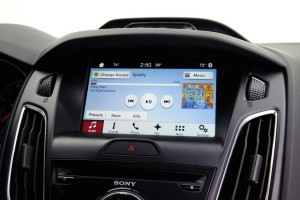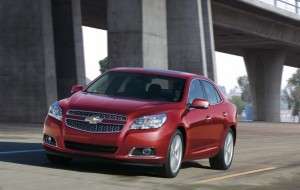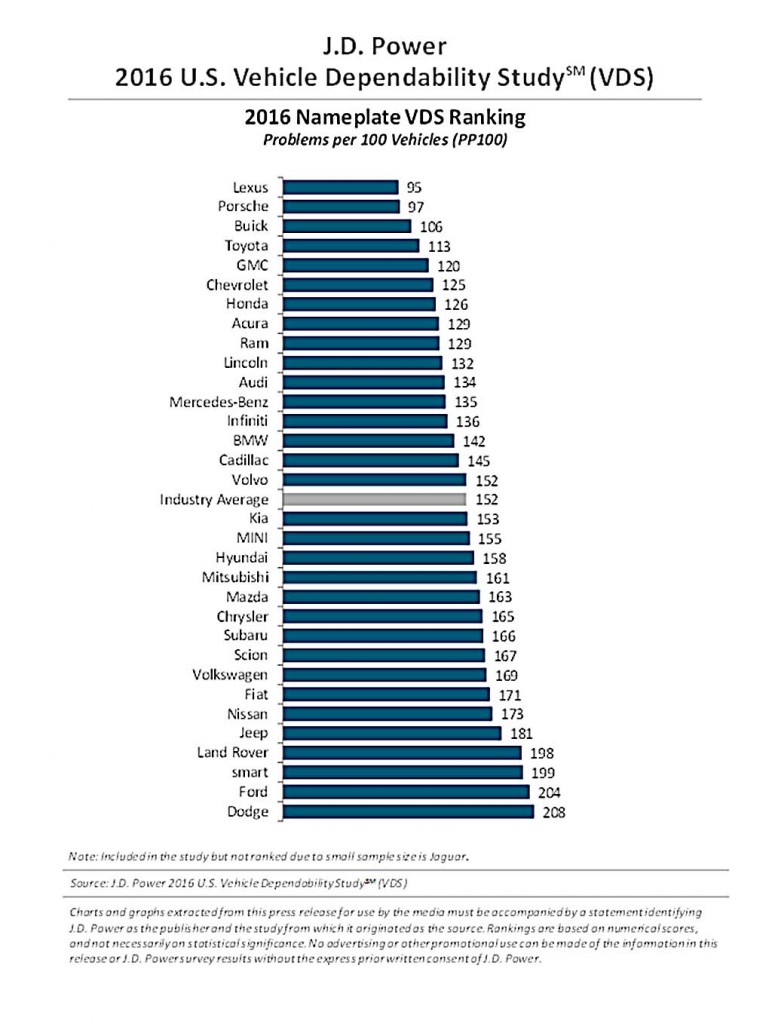Two things seem to be true about the newest cars coming to market these days: they’re likely to have lots more high-tech features than the vehicles they replace. But they’re also likely to have more reliability issues, largely as a result of problems with those new tech features, according to J.D. Power’s 2016 Vehicle Dependability Study.
The VDS queried owners of 2013 model-year vehicles and found that, on average, dependability dropped 3% year-over-year. It found that one in five of the problems owners reported involved audio, communication, entertainment and navigation technology. Collectively known by the acronym ACEN, these systems are, collectively, the single largest source of trouble owners reported.
“The increase in technology-related problems has two sources,” said Renee Stephens, vice president of U.S. automotive research at J.D. Power. “Usability problems that customers reported during their first 90 days of ownership are still bothering them three years later in ever-higher numbers. At the same time, the penetration of these features has increased year over year.”
Couple the ongoing problems motorists face with high-tech gear along with the recent surge in vehicle recalls – which hit record levels two years in a row – and the auto industry is facing a crisis of confidence. That, in turn, has a direct impact on purchase decisions and brand loyalty, stressed Stephens. Among buyers who’ve experienced no vehicle problems, 55% are likely to remain brand loyal. That slips to 41% after an owner experiences three or more issues.
(Cause finally found for exploding Takata airbags. Click Here for that breaking story.)
Longer-term, reliability issues also mean consumers may be less willing to embrace the new semi- and fully-autonomous vehicle technologies that are beginning to work their way onto the market. The first true, self-driving models are expected to be in production by 2020.
While the number of reported problems has increased in the latest Power Vehicle Dependability Study, a few things carried over:
- Lexus remained the brand with the highest vehicle dependability for the fifth year in a row;
- Porsche, already one of the top five brands, now moves up to second;
- Buick, Toyota and GMC rounded out the top five.
In something of a surprise, however, General Motors managed to nab eight individual segment wins with products such as the Buick Encore, Chevrolet Camaro and GMC Yukon. Toyota took six segment honors for products including the Lexus GS and Toyota Sienna.
General Motors has been steadily improving in quality and reliability, according to J.D. Power surveys from the last several years.
But that’s in sharp contrast to the reliability ratings reported by Consumer Reports this week. The non-profit put Audi and Subaru at the top of its annual Automotive Report Card. The ratings, which take into account road tests as well as owner feedback, found Detroit makers scoring mid-pack, at best.
(Click Here for more on the CR Automotive Report Card.)
In terms of the J.D. Power study, the overall industry score was 152 problems per 100 vehicles, up from 147 problems in the 2015 VDS.

Problems with high-tech infotainment systems, such as Ford's Sync, have been a constant source of headaches for motorists.
Two of the most frequent complaints involved Bluetooth systems that failed to pair with a motorist’s phone, and voice recognition systems that couldn’t understand verbal commands.
Power researchers concluded that fundamental design issues were behind seven of the 10 most frequently reported reliability problems – and 39% of problems overall.
While high-tech issues have become increasingly common, the new Power VDS finds that mechanical issues continue to be less frequent. On average, the number of engine and transmission problems owners reported dropped by 7.5%.
The 2016 Vehicle Dependability Study’s results are based on surveys filled out by 33,560 original owners of 2013 model-year vehicles.
(Click Here to find out which are the cheapest – and most expensive – vehicles to insure.)




Yup, most people I know don’t bother much with the electronic nightmares their new cars come equipped with. They’ll concentrate long enough to figure out how the phone and music works. Then they go on vacation figuring that they’ll work out how the nav works as they go. Hah! The menu systems rarely make sense to the average joe, showing a distinct lack of human engineering, merely design by War of Witchcraft gamers, who figure everyone else thinks like them.
It appears that the nitwits who design these systems figure that spending half an hour figuring how to turn off the heated seats via touchscream is no prob. And so on.
Now put the drivers in an automated car with 99 customization features, and the usual computer crash nightmare. Why in heck would you put your life in trust to half-baked solutions powered by cheap consumer grade electronics, and sensors that a loose-bowelled bird can obscure?
Sure, the average joe will buy one of these things delighted with a new toy, and then when the horror stories begin, the whole idea will crash. After all, these automated cars won’t be like an automated Google pod housing two PhD research engineers, driving itself like grandma at 5mph under the limit in perfect weather causing accidents and then snapping pix afterwards so that Google can claim it wasn’t their car at fault. No it was the cars piloted by humans who reacted to the stupid automated car.
If these things are ready for prime time in 4 years, I’ll eat my hat.
If it needs a cell phone to make it functional, I do not want it.
Let me just turn on the radio, turn a knob and that is all I need. Not a damn screen with a bunch of worthless apps on them, that I will never use, do not want and did not asked for. All that fumbling with the screens is more dangerous that actual texting on the phone.
Let me be able to turn off any tracking system that my auto is using to locate me.
I do not use any auto blue tooth system that is built into my auto…never will…nor do i use the Navi. system that it has. Rather use my own and it is more up to-date, too.
Just give me the ability to remove stuff I do want. Or even better, just stop putting it there.
Auto makers are getting worse that cell phone companies and adding apps that you do not want because they are into the selling of services, now. Heck with the customer wants.
Congress needs to pass some laws to give the owners rights on this electronic junk.
It is just as bad as photo cameras, license plate readers and other invasion of privacy that is all going on in full blast but over looked by our elected officials.
Just the professional lobbyist must finally per$auded them to overlook it all,